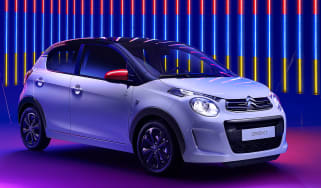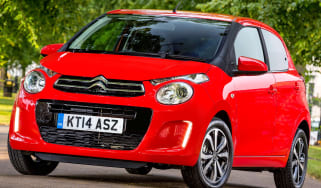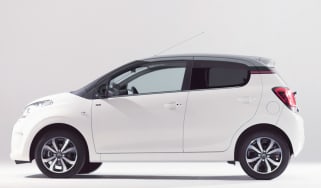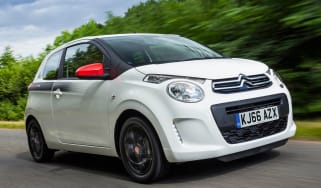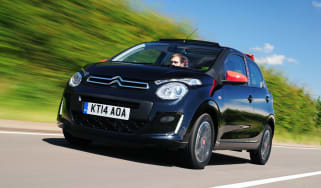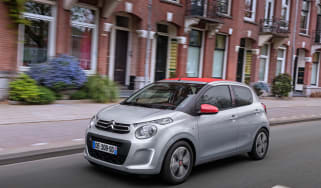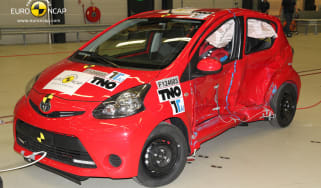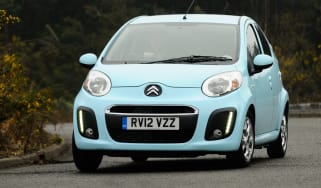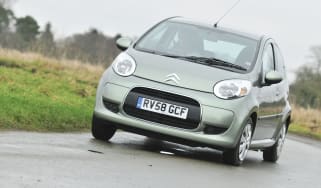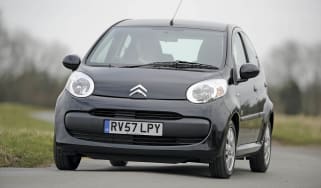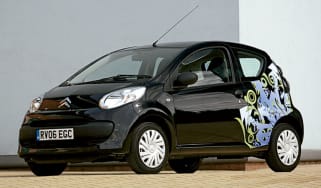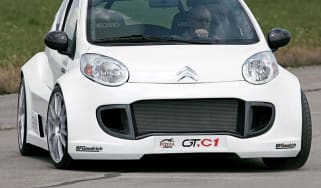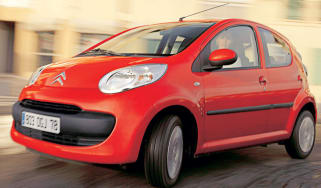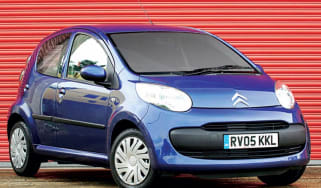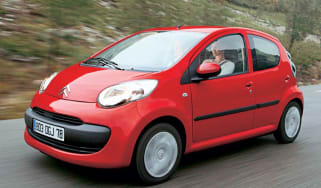Citroen C1 (2014-2022) review
It’s got plenty of style and it’s decent to drive, but the Citroen C1 loses out to more practical city car rivals

The Citroen C1 makes a good first impression with its distinctive styling – a result of quirky split-level headlights and an extensive range of contrasting colour and trim options. The colour continues inside, which gives the car cheerful feel, plus this latest C1 is more lavishly equipped than the original.
Despite styling which still manages to look fresh, the Mk2 C1 carries over a great deal from the previous model. Refinement is better than before, although the engine emits a typically audible three-pot thrum when pushed, and the ride can get quite unsettled. The rear seats and boot are quite cramped compared to rivals, too. So while the Citroen C1 is chic, fun and affordable, other city cars can do what it does better.
About the Citroen C1
The Citroen C1 dates back to 2005 when the city car was launched alongside its sister models, the Peugeot 108 and Toyota Aygo. They were the result of the Toyota Peugeot Citroen Automobile (TPCA) joint venture, with the cars built in the Czech Republic.
Billed as a second generation model, but based on the old platform, the current C1 arrived in 2014, and like its predecessor, it shares much with its Peugeot and Toyota siblings. But while the former C1 and 108 were visually very similar, the new versions are notably different. The 1.0-litre engine from the old Citroen C1 has been carried over. A five-speed manual gearbox is fitted as standard on all models, with no automatic option offered.
Used - available now

2022 Nissan
Qashqai
54,000 milesAutomaticPetrol1.5L
Cash £18,495
2023 Peugeot
E-2008
40,622 milesAutomaticElectric
Cash £12,379
2018 Audi
TT
62,425 milesManualDiesel2.0L
Cash £12,368
2022 MG
HS
24,791 milesManualPetrol1.5L
Cash £12,975Both three- and five-door versions of the C1 are offered. Entry-level Touch trim is only offered in three-door form, while Feel and Flair trims are available as both three- and five-door models. Upper-level Urban Ride and Origins trims are five-door only, and five-door models are also available with an 'Airscape' peel-back fabric roof for around £930 extra with Feel, Flair and Urban Ride trim levels. Rivals to the C1 include the 108 and Aygo, along with the likes of the Kia Picanto, Hyundai i10, Skoda Citigo and VW up!
The range kicks off with the basic Touch trim level, which offers front electric windows, LED daytime running lights, 14-inch steel wheels and remote central locking. It's a rather basic affair, and customers would be advised to upgrade to the Feel model. This adds air conditioning, a 7-inch touchscreen, DAB digital radio and 15-inch steel wheels. The Flair includes a reversing camera, chrome exterior trim, tinted rear windows, leather steering wheel, and electric and heated door mirrors.
While the little city car has lots to commend it, many customers in the sector are price-led and to that end dealers often offer attractive Citroen C1 deals. Good value special editions are worth looking out for too.
The Citroen C1 makes a good first impression with its distinctive styling – a result of quirky split-level headlights and an extensive range of contrasting colour and trim options. The colour continues inside, which gives the car cheerful feel, plus this latest C1 is more lavishly equipped than the original. Despite the fresh styling, the Mk2 C1 carries over a great deal from the previous model. All models are powered by the 71bhp 1.0-litre VTi 72 three-cylinder petrol engine..
Refinement has been improved but the ride can get quite unsettled. The rear seats and boot are quite cramped compared to rivals, too. So while the Citroen C1 is chic, fun and affordable, other city cars can do what it does better.
Engines, performance and drive
As the Citroen C1 uses the same underpinnings as its predecessor (except for a redesigned rear axle, saving 4kg, plus new shock absorbers and revised anti-roll bars), it’s not surprising to find that it feels rather similar from behind the wheel.
This means a supple ride that irons out small imperfections in the surface well, but can become a little bouncy over a series of consecutive bumps, as well as light steering that offers barely any feedback yet is a doddle to use around town. It's still fun to chuck around if you feel like doing that, and the manual gearchange is decent, but it can't match rivals like the Skoda Citigo for handling.
The soft suspension and numb steering mean body control is fairly loose in corners, although parking is especially easy given the car’s dinky overall length.
Engines, 0-62 acceleration and top speed
Buyers are limited to an updated version of the old car’s 1.0-litre VTi triple, here making 71bhp. As there’s just 840kg to haul around, the C1 is a decent performer, even from low revs where it’s happy to pull away from a crawl in third gear.
The 1.0-litre lacks oomph at motorway speeds and is generally sluggish. At idle, the three-cylinder 1.0-litre thrums loudly, but soon settles down once you get going.
The figures hammer home the point, as the 1.0-litre model takes a leisurely 14.0 seconds to sprint from 0-62mph. If you're mainly going to be driving the car around town and over shorter distances, the 1.0-litre engine is still a good choice, revving sweetly and achieving a claimed 58mpg on the combined cycle.
If you’re planning on driving extended distances in either, be prepared to steel yourself against the noise – or take earplugs. That charismatic three-cylinder thrum is fun to start with, but turns into a tiring drone at higher cruising speeds.
MPG, CO2 and running costs
The previous-generation C1 was offered with a diesel engine, but that was dropped in 2009, and the focus since has been on small-capacity petrol units.The C1 emits 108g/km in its most basic form, rising to 117g/km for the slightly heavier Airscape model. Economy, under stricter WLTP testing, is still impressive at 54.8 - 58.9mpg over the combined cycle.
Insurance groups
The little Citroen is not a common choice for fans of high-performance cars, or a target for thieves, and as a result insurance groups are reassuringly low. They range from group 7E for an entry-level Touch model, rising no higher than group 11E if you choose a five-door Origins version or an ‘Airscape’ Urban Ride model.
So if you’re a mature driver with a decent driving record, you’ll be laughing. Younger motorists, or those whose insurers consider them a liability, might want to look elsewhere, though. For example, the Kia Picanto range starts from insurance group 4.
Depreciation
The previous-generation Citroen C1, Peugeot 107 and Toyota Aygo turned out to be winners on the depreciation front; and although the C1 held on to the least value of the trio, there wasn’t a great deal in it. The counterpoint is that the Citroen was the cheapest of the trio to buy new. That remains the case today, with the C1 costing less than its equivalent Peugeot 108 and Toyota Aygo sister models.
Of course, considering the added competition in the city car sector these days, those rock-solid residuals have softened a fair bit, but with the starting prices so low the financial pain is reduced – even when you’re losing 60 per cent or more of the new value after three years. Plus, you can reduce your exposure further by agreeing a decent discount, which Citroen dealers are often open to negotiating.
To get an accurate valuation on a specific model check out our free car valuation tool...
Interior, design and technology
Although the latest Citroen C1 has almost identical dimensions to its predecessor – not surprising as it’s a development of the previous-generation model’s platform – the company has done a great job of making the design fun, fresh and entirely different from its Toyota and Peugeot sister cars.
The split headlight design is an interpretation of the same theme you’ll find on the Citroen C4 Cactus, while vertical LED lights are integrated neatly into the front bumper.
At the rear, square 3D-effect tail-lights and a blacked-out glass tailgate are also distinctive, while the side profile is shared with the Aygo and 108. It’s a similar story with the interior design; this is replicated across all three of the city cars, with the exception of the badges.
Colour-coded trim on the centre console and gear lever surround, as well as flashes of exterior colour on the doors and the option of striped seat upholstery, ensure the C1’s interior is light and cheery.
The driver sits in front of a single binnacle housing a large speedometer dial, while the infotainment and nav systems are located on a separate ‘floating’ binnacle in the centre of the dash. It looks good, but the cabin control layout is less intuitive from the driver’s perspective than, say, a Volkswagen up!
Push and scratch some of the surfaces and it’s instantly obvious that the quality of materials isn’t up to the standard of class leaders, although the Mk2 C1 has a better finish than before, and by no means feels bargain basement.
The little Citroen doesn’t feel like a technology fest inside, but buyers don’t expect much at this end of the new car market. Even so, there are some highlights – apart from the touchscreen and reversing camera (on Flair models), you can have keyless entry and keyless start, while all versions of the C1 feature hill-start assist.
Sat-nav, stereo and infotainment
All models except entry-level Touch come equipped with a seven-inch touchscreen designed to mirror the screen of Android smartphones. The trouble is, as promising as this sounds, the technology doesn’t feel as though it’s been fully developed yet. The operating interface isn’t seamless, and may cause some frustration to people who are used to the slick interfaces on tablets and consoles. The MirrorLink function is not compatible with all smartphones, either. The Flair and Feel models also come with Apple CarPlay and Android Auto compatibility.
Practicality, comfort and boot space
If you want an affordable car that can transport four adults over short distances, but will be used mainly with one or two passengers on board, then the Citroen C1 is a good choice. We’d go for the five-door model, simply because it only costs £400 more than the three-door and makes access to the rear much easier, yet looks just as good. You can order the five-door Feel, Flair and Urban Ride models with an Airscape peel-back fabric roof for £930 extra. This set-up adds another dimension to the character of the Citroen C1, but causes refinement to suffer slightly at higher speeds.
It’s not surprising that rear seat passengers aren’t terribly well catered for, although the story is mixed up front, too. While there’s plenty of room, drivers don’t get the range of adjustability expected of bigger cars. So there’s no reach adjustment on the steering wheel, and the basic model doesn’t offer seat height movement, either. If you intend to spend much time behind the wheel, you’d better make sure you can get comfortable.
Dimensions and size
Every model in the current crop of city cars is cleverly packaged, but the Citroen C1 is one of the most compact of the bunch.
At 3,465mm from nose to tail, it’s comfortably shorter than the 3,645mm Hyundai i10 and 3,563mm Skoda Citigo. It’s narrower, too – the 1,615mm-wide C1 compares to the 1,660m i10 and 1,641mm Skoda. No wonder parking is a doddle.
Leg room, head room & passenger space
Adults sitting in the back will just fit behind a similarly sized driver and passenger, but it’s a serious squeeze and rear headroom is tight for anyone approaching six feet tall. And while there are seatbelts in the rear for three passengers, they’d better be very skinny.
You do get Isofix mounts for child seats, but you’ll want the five-door version to install them (and the kids) unless you’re a contortionist. Still, finding homes for your other bits and pieces shouldn’t be too hard, as there’s a good-sized glovebox, cup-holders and storage in the centre console.
Boot space
While the Citroen C1 can carry four adults at a push, it’s best to leave your luggage behind if you have any, as the 196-litre boot is only really suitable for small shopping bags. If you need more space you can fold the rear seats down – this frees up a maximum boot capacity of 780 litres – although the C1 isn’t helped by the fact its seats don’t fold completely flat. It’s also hampered by a relatively high loading lip.
If space is a critical issue, consider the Skoda Citigo or Hyundai i10; both serve up over 250 litres without the need to fold the seats.
Reliability and safety
By carrying over the basic chassis architecture and 1.0-litre engine from the previous-generation C1, Citroen is working with proven mechanicals.
French manufacturers don’t have the best reliability records, but considering a large chunk of the development work was conducted by Toyota (a brand famed for its bulletproof dependability), it’s a safe bet that the C1 won’t go wrong very often.
Under the skin, the C1 is a simple car so there’s relatively little to break – and although the quality of some of the interior materials isn’t up the standard of some rivals, there’s nothing yet to suggest it won’t be sufficiently resilient. The C1 didn't feature in our 2022 Driver Power owner satisfaction survey, while Citroen was voted into 13th position out of 29 manufacturers - ahead of Volkswagen, Ford and Mercedes.
While changes under the skin are limited, Citroen’s engineers bolstered the side impact protection, in a bid to improve on the previous-generation C1’s three-star Euro NCAP rating. This latest car achieved a four-star crash test score when it was tested in 2014.
There’s plenty of safety kit available as standard, including six airbags, a chassis stability system, electronic brake assistance and tyre pressure monitoring, which we reckon puts the C1 up there with the best cars in the class.
Warranty
The mechanically identical Toyota Aygo comes with a five-year/100,000-mile warranty package, so Citroen C1 buyers might be a little miffed to discover that their car is supplied with only three years and 60,000 miles of cover. The Hyundai i10 is sold with a five-year deal, too, although the Skoda Citigo carries a similar three-year package to the Citroen.
Servicing
If you’re buying a Citroen C1 as part of an economy drive, you’ll be pleased to know that servicing costs won’t break the bank. Citroen does offer a servicing package or 3 years/35,000 miles. The dealer will want the car back every 15,500 miles or 12 months to give it a check-up, and service costs start from around £115.




